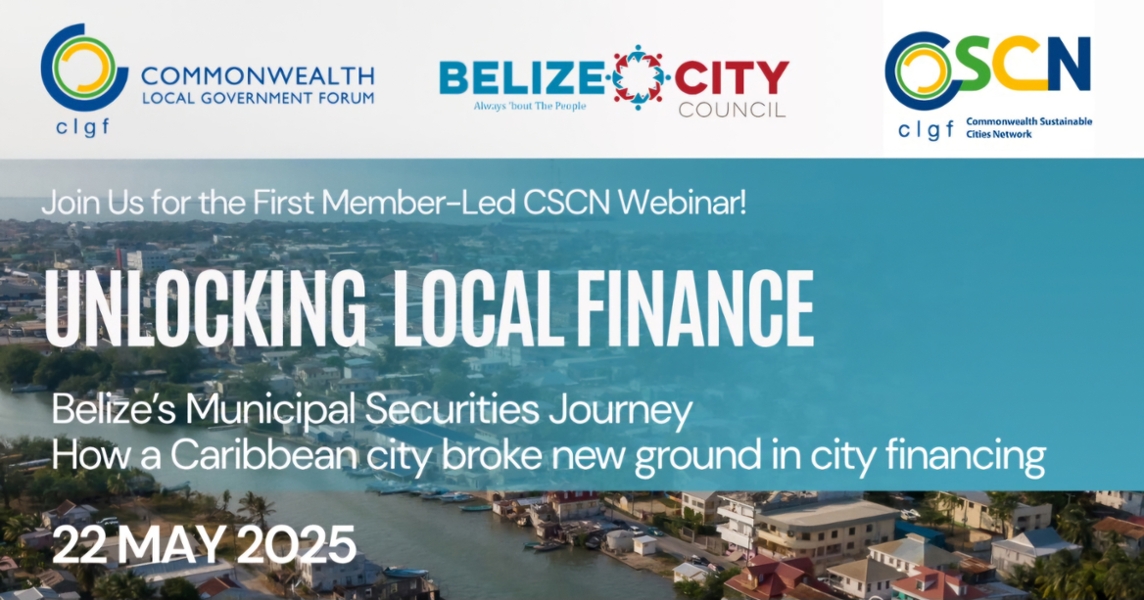Innovation in unlocking municipal finance

27 May 2025
The Commonwealth Sustainable Cities Network (CSCN) brings together cities from across the 56 member states of the Commonwealth. CLGF formed the CSCN to respond to rapid urbanisation in the Commonwealth and to mobilise practitioners and leaders with a particular interest in urban development. The network meets regularly in person and online and at each of these meetings it is increasingly clear that many of the challenges being faced in cities and urban areas are shared, what is of course often different is the context in which they are being addressed. CLGF is always keen to explore different ways not just to bring members together but to offer platforms for meaningful exchange and it was from this principle that the concept of the member-led webinar series was born. It was especially fitting for Belize City, where CLGF’s Chairperson, Bernard Wagner, is the Mayor, to lead the first webinar.
The Member-led webinars take a specific theme and the lead member will use the opportunity to share a detailed case study of their experience and this will be followed by reflections from another member which is adopting or delivering a similar approach or project. In the case of this webinar Belize City have successfully issued two municipal bonds or securities, to invest in the development of the city, and the Government has recently updated the municipal service regulations of 2023, which have expanded the tools available to municipalities like Belize City to introduce municipal notes and bonds.
The webinar focused on what this has meant in terms of investment in Belize City and some of the steps that the City has had to take. The respondent in this case was James Matsie, Municipal Infrastructure Finance Specialist, from the South African Local Government Association (SALGA), who has a track record of issuing municipal bonds and James reflected on what the Belize team shared, as well as the experience from South Africa and then the session was opened to the participants.
Belize City municipal bonds
Eluide Miller, Deputy Mayor of Belize City, explained that although not the country’s capital, Belize City is a financial and commercial hub of the country, and home to the majority of business activity, making the city’s development trajectory especially important to the national growth of Belize. He described, as with many Caribbean municipalities, that there has been an increasing public demand for better infrastructure, service delivery and climate resilience, all while managing limited fiscal finances and external shocks. It was these realities that had led to the City to chart a new course to craft and operationalise a municipal financing framework that was not only fit for purpose, but fit for Belize City's future.
Growing trust in municipal leadership
Mr Miller said that the journey was even more meaningful as the investors were not just supporting an instrument, but directly investing in the development and future of Belize City, which is a reflection of a growing trust in municipal level leadership and a shared commitment to sustainable urban progress. Central to this has been the update of the municipal service regulations of 2023.
He emphasised that municipal bonds are not only a viable option to fund local development priorities, but also a way of strengthening local autonomy, demonstrating credibility, and creating genuine partnerships between government, community and the private sector. Belize City continues to lead the charge in smart city initiatives in the country, as well as electric mobility, with numerous smart city projects to modernise urban living through advanced technology and forward-thinking solutions. They are expanding and enhancing traffic control light systems and improving on and off street parking, including the recent addition of the new Smart City team facilities and the introduction of the first set of electric buses, with the recent launch last week of the first electric taxis. He concluded: “With the support of our advisors, like Legacy Fund Ltd, we hope to continue capitalising on these financial facilities to build a Belize city that is safe resilient and full of opportunity for all.”
Financial expertise
Mr Ervin Perez, Managing Director of Legacy Fund Ltd and financial advisor to Belize City Council pioneered the development of the Belize capital market for the successful structuring and public issue of domestic securities, including the first municipal and education bonds in the Caribbean. He explained that understanding the macroeconomic background of the country was important and understanding the structural challenges that exist. He noted that even when new laws and regulations are in place, improvement is still needed to further capitalise on what is possible. He told the audience that, like many other Commonwealth countries in 2012, Belize had a high level of national debt, and had defaulted on its international bonds, resulting in national government having tremendous fiscal constraints on its ability to finance public investments, and to support the required public infrastructural investments needed in the city. He stressed the importance of trust, legislation and sound financial management and auditing.
Paving the way for broader legislation
The 2012 Belize City Council Municipal Bonds Act allowed the issuing of bonds, but was very specific and only provided for Belize City to do this. Belize’s success in issuing bonds, however, led to new legislation in 2023, which made it possible for all municipalities reaching the criteria to issue bonds. He described the structural challenges, such as the short electoral cycle for local government, which does not facilitate longer-term planning; and also increases the turn-over for critical staff in leadership roles, technical experts and finance managers. Local government remains dependent on central government for approval of many of its decisions.
Reforms required
He explained the policy and legal reforms that were required, which included amendments to existing laws and regulations and enactment of new ones to provide a robust legal basis for municipal securities and financing instruments. He stressed the need for capacity building, in terms of human and institutional capacity, essential to strengthening planning, budgeting and project execution at the local level. Greater community engagement aids long-term and participatory planning, promoting visionary municipal development plans which can foster public trust and accountability. Moreover, this will help secure buy-in for long term investments. Finally he said that there is a need for broader general legislation to define the fiscal powers and autonomy of local authorities. Strong local leadership is vital, with the confidence to do something different, based on the given opportunities.
A view from South Africa
James Matsie, the Municipal Infrastructure Finance Specialist, from the South African Local Government Association (SALGA) has spearheaded initiatives designed to boost service delivery and to strengthen infrastructure financing across municipalities in South Africa. He began by saying that South Africa is an evolving country of regulation, intergovernmental coordination and, ultimately, leveraging capital markets. With regard to bond markets, he said that South Africa is one of the few countries in Africa with an active bond market, and though still relatively shallow, it has seen innovation and growth especially among the metropolitan cities. There are challenges with scaling capacity and market depth. Johannesburg was the first South African city to issue bonds in 2004; and the latest bond, a green bond, was issued was by the City of eTthekwini in 2022. The bond market in South Africa makes up less than 1% of the total securities market.
The bonds are listed on the Johannesburg Stock Market. He stressed that he believed the success of the bonds was due to strong legislative frameworks; with detailed financial guidelines, and a policy framework that emphasises the 'golden rule': that national government will not guarantee the debts of local government.
He emphasised the importance of both good financial management and enabling legislation. He called for greater capacity for cities and local governments, not only to leverage finances, but also to plan effectively for spending the resources they raise.
The session was moderated by CLGF’s Senior Programme Officer for networks, Janine Xavier-Cross, and following a dynamic question and answer session she highlighted some of the main points made by both the speakers and also those participating in the discussion.
Key takeaways
Clear legal and regulatory frameworks
- Establish enabling legislation for municipal borrowing.
- Ensure municipal autonomy to issue bonds or access finance without excessive central oversight.
Strong institutional capacity
- Build internal expertise in finance, compliance, and project management.
- Invest in administrative systems to manage debt and revenue streams transparently.
Robust revenue management
- Strengthen local revenue collection and management systems to build creditworthiness.
- Diversify revenue streams aligned with sustainable development goals.
Long-term strategic planning
- Align local financing initiatives with national development plans (e.g. Plan Belize 2.0).
- Prioritize climate resilience, infrastructure, education, and digital transformation.
- Address the challenge of short political terms versus long bond maturities by institutionalizing multi-year planning, ensuring continuity of financing commitments beyond election cycles.
Partnerships and peer learning
- Leverage support from institutions like the World Bank, CLGF, UCLG, and regional networks.
- Participate in peer exchanges and capacity-building opportunities.
Community and stakeholder engagement
- Build public trust and maintain transparent communication with residents and bondholders.
- Engage universities and civic actors to align financing with inclusive development goals.
Risk mitigation and political stability
- Maintain consistent communication with investors.
- Minimize political risk to ensure favourable bond terms and investor confidence.
Innovation in financing instruments
- Consider municipal, green, and social impact bonds tailored to local priorities.
- Explore pooled financing or blended finance to lower entry barriers for smaller cities.
Are you keen to share good practice from your city?
This will be the first in a series of webinars and we are actively looking for cities keen to share their good practice and experience. For more information on this, please contact Janine Xavier-Cross and keep an eye on the CSCN pages on the CLGF website
Back to News





